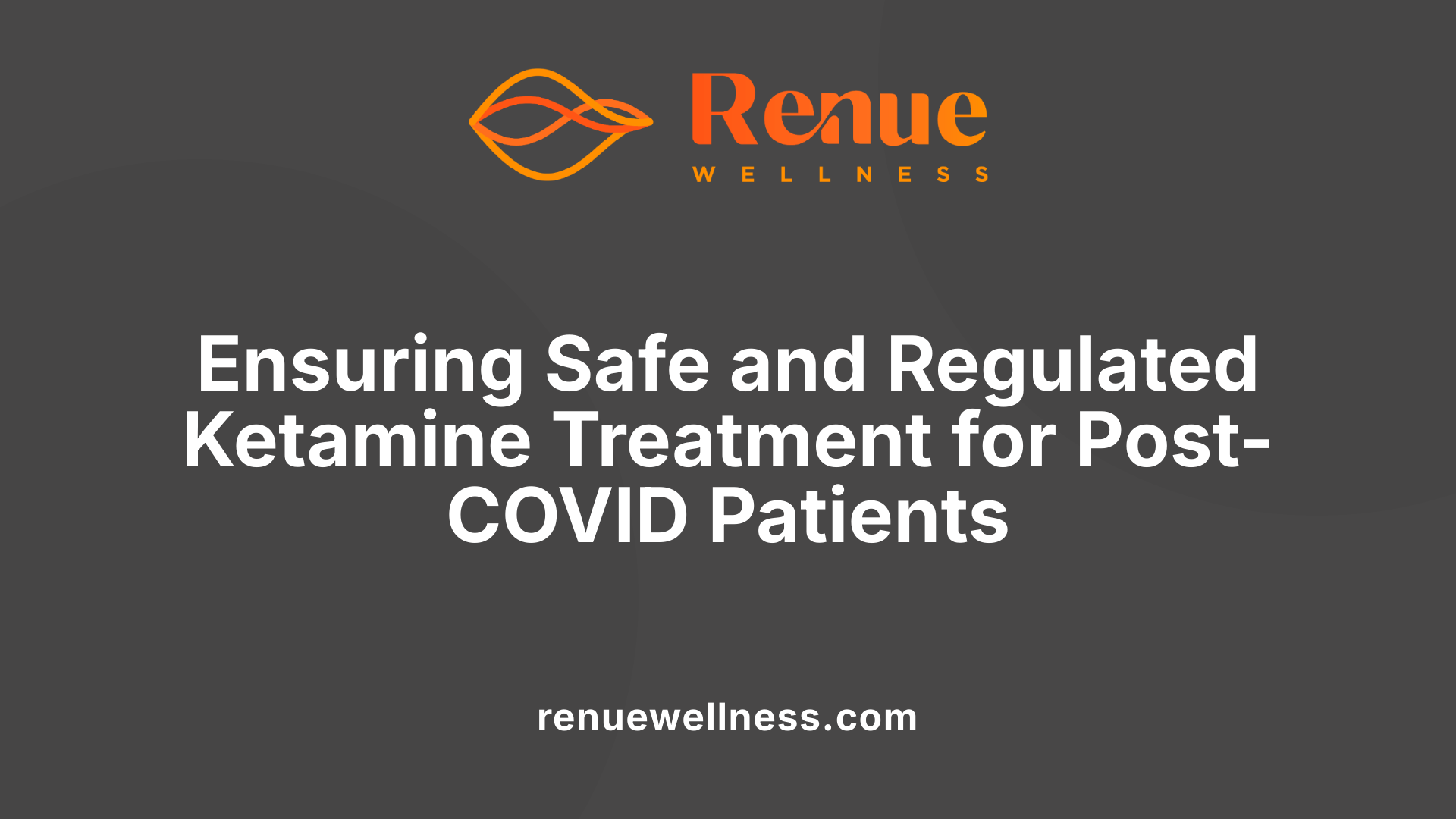Post-COVID Mental Health Challenges & Ketamine’s Role


August 13, 2025
Understanding the Intersection of Long COVID and Mental Health
The COVID-19 pandemic has profoundly affected mental health worldwide, with many survivors experiencing persistent neuropsychiatric symptoms such as depression, anxiety, brain fog, and fatigue. As the long-term impacts of COVID-19 become clearer, the medical community is exploring innovative treatments. Among these, ketamine has emerged as a promising candidate, especially for treatment-resistant cases and symptoms related to Long COVID. This article delves into the complexities of post-COVID mental health challenges and assesses the evolving role of ketamine in addressing these conditions.
The Mental Health Aftermath of COVID-19
What are common mental health issues related to COVID-19?
COVID-19 has significantly affected mental health worldwide. Many individuals face increased levels of anxiety, depression, and stress due to the pandemic's ongoing challenges. Those with Long COVID often experience neurological symptoms such as difficulty concentrating, sleep disturbances, and mood disorders, which further exacerbate mental health struggles.
Adolescents have also been particularly vulnerable, exhibiting higher symptoms of anxiety and depression along with changes in brain development. The social isolation, economic hardships, and health fears stemming from COVID-19 have contributed to a surge in psychological conditions and increased demand for mental health services.
Research highlights that these mental health issues are widespread and persistent, underscoring the need for accessible treatment options, community support, and ongoing research to better understand and address these challenges.
How has COVID-19 impacted mental health generally?
The pandemic has left a profound mark on mental health globally. Feelings of loneliness, helplessness, and uncertainty have led to increased episodes of anxiety and depression. Many individuals report ongoing symptoms even in 2022, indicating that the psychological effects are enduring.
Vulnerable groups—such as older adults, those with pre-existing mental health conditions, and frontline workers—are at higher risk of severe mental health issues. Anxiety, sleep disruptions, and emotional distress are common, and stigma or misinformation can hinder people from seeking help.
The pandemic has also revealed gaps in mental health infrastructure, prompting efforts to improve mental health literacy, expand telehealth services, and develop community-based support systems. Addressing this mental health crisis remains a priority for health systems worldwide.
Has the prevalence of mental health issues increased during the COVID-19 pandemic?
Yes. Studies report a significant rise—about 25%—in anxiety and depression during the pandemic's first year. Stressors such as social distancing, financial uncertainty, and fear of illness have fueled this increase.
Younger populations and women have been disproportionately affected, with higher reports of suicidal thoughts and self-harm. Disruptions to mental health services and limited access to in-person care have led to more reliance on online platforms and telehealth services.
This surge emphasizes the urgent need for mental health interventions, resilient health policies, and community outreach to mitigate the long-term impacts.
What are the benefits of ketamine in treating mental health conditions?
Ketamine is renowned for its rapid and potent antidepressant effects, making it particularly useful in treatment-resistant depression. Around half of the patients treated with ketamine find substantial relief, often within hours after administration.
Its effects can last from days to several months, with some studies reporting remission rates over 40% after a year of therapy. Additionally, ketamine quickly reduces suicidal thoughts, with approximately 78% of suicidal patients showing improvements.
Despite potential side effects like dissociation, dizziness, and nausea, ketamine's safety profile in controlled medical settings is favorable. It acts on the glutamate system, fostering neuroplasticity and neural connectivity, which are critical for recovery.
The popularity of ketamine has grown, especially for individuals unresponsive to conventional treatments, offering a promising short-term strategy for managing severe mental health conditions.
What is known about the potential of ketamine to treat post-COVID neuropsychiatric symptoms?
Emerging clinical reports suggest ketamine may help tackle neuropsychiatric symptoms associated with Long COVID, including depression, brain fog, fatigue, and cognitive decline. A notable case involved a Long COVID patient showing rapid remission of depressive symptoms and suicidal ideation after intranasal ketamine.
The mechanism behind these benefits largely relates to ketamine's anti-inflammatory properties. It reduces cytokines such as IL-6 and IL-17A, which are elevated in Long COVID and contribute to neuroinflammation.
Because Long COVID involves dysregulated immune responses and chronic inflammation, ketamine’s ability to downregulate inflammatory mediators could alleviate neuropsychiatric issues. Ongoing trials are exploring its safety, tolerability, and efficacy in this context.
While initial findings are promising, further research is essential to validate ketamine as a standard treatment for post-COVID neuropsychiatric symptoms.
What are the safety, regulatory considerations, and risks related to ketamine therapy for post-COVID conditions?
Using ketamine for Long COVID symptoms involves certain safety considerations. It is not yet FDA-approved specifically for this purpose, and long-term safety data are limited.
Common side effects include transient dissociation, dizziness, nausea, and blood pressure elevation. Rare but serious risks involve liver and bladder damage, especially with high doses or unregulated use. Dependence potential and cognitive effects over prolonged use also raise concerns.
Strict supervision by qualified healthcare providers is vital for safe treatment. Patients should undergo thorough assessment, informed consent, and regular monitoring throughout therapy.
Regulatory issues include the off-label use of ketamine, with some formulations like compounded products lacking FDA approval. This underscores the importance of controlled, clinical settings to minimize risks.
What treatment options, including telehealth and clinical trials, are available for post-COVID mental health issues?
Treatment for post-COVID mental health challenges spans a range of options, with telehealth becoming increasingly prominent. Telehealth services provide remote access to psychotherapy, medication management, and group support, ensuring continuity of care while overcoming geographical barriers.
Remote clinical trials are also evolving, allowing researchers to evaluate therapeutic interventions like ketamine, fluvoxamine, and other agents through virtual platforms. These facilitate wider participation, especially for patients in underserved or remote areas.
Both approaches reduce stigma, lower costs, and improve access, although they require adequate technological infrastructure and regulatory oversight.
Together, telehealth and remote trials expand the capacity for early intervention and personalized treatment in post-COVID mental health care.
How does ketamine work to improve mental health challenges following COVID-19?
Ketamine improves post-COVID mental health issues primarily through its effects on the glutamate system, promoting rapid neuroplasticity and neural repair. It stimulates the release of glutamate, fostering the growth of new neural pathways critical for mood regulation.
Additionally, ketamine reduces neuroinflammation by lowering cytokine levels like IL-6 and IL-17A, which are implicated in depression and cognitive dysfunction in Long COVID.
This dual mechanism accelerates recovery from symptoms like depression, brain fog, and fatigue, often within hours or days after administration. Its anti-inflammatory and neuroplasticity-enhancing properties make ketamine a promising candidate for addressing the neuropsychiatric sequelae of COVID-19.
What are future research directions regarding ketamine as a treatment for Long COVID-related psychological and neurocognitive issues?
Future research should focus on understanding the long-term safety and efficacy of ketamine for Long COVID. Key areas include optimizing dosing protocols, routes of administration, and treatment schedules.
Studies are needed to explore the neurobiological mechanisms—particularly how ketamine modulates immune responses and promotes neuroregeneration in Long COVID patients.
Biomarker-driven approaches could personalize treatment by identifying patients most likely to benefit. Additionally, combining ketamine therapy with behavioral interventions could enhance overall recovery.
Large-scale clinical trials and longitudinal studies will be essential to establish standardized protocols, evaluate potential risks, and clarify long-term effects, ultimately guiding clinical practice for this emerging application.
The Neurobiological Impact of COVID-19 and Potential Role of Ketamine

How has COVID-19 impacted brain health and neurological function?
COVID-19 has been found to affect the brain both directly and indirectly. The virus can invade neural tissue through neuroinvasion pathways or by causing systemic inflammation that impacts the brain. Patients often report neurological symptoms like brain fog, fatigue, headaches, and cognitive impairments. Inflammation plays a significant role here; elevated levels of cytokines such as IL-6 and IL-17A are associated with mood disorders and cognitive decline post-infection. This chronic inflammation can lead to structural and functional changes in the brain, contributing to neuropsychiatric symptoms like depression and anxiety. The ongoing immune response and cytokine imbalance perpetuate neural damage, underscoring the importance of treatments that address neuroinflammation.
What is known about the effects of COVID-19 on brain structure and function?
Research reveals that COVID-19 can cause noticeable changes in brain anatomy and activity. Structural imaging studies have identified alterations in white and gray matter, including reductions in brain volume, which are linked to impaired cognitive functions. Functional disruptions have also been observed, especially in neural circuits involved in mood regulation and cognition. These changes are often linked to inflammation-induced damage — cytokines and immune mediators can cross the blood-brain barrier, leading to neural tissue injury. Symptoms such as memory deficits, difficulty concentrating, and mood swings are closely associated with these structural and functional alterations. Addressing neuroinflammation and promoting neural recovery are therefore crucial in managing post-COVID neurological sequelae.
How might ketamine’s pharmacological properties counteract COVID-19’s neurological effects?
Ketamine holds promise as a potential therapeutic agent for post-COVID neuropsychiatric conditions due to its diverse pharmacological actions. As an NMDA receptor antagonist, ketamine promotes neuroplasticity by enhancing synaptic connectivity and stimulating the formation of new neural pathways. Its ability to modulate excitatory neurotransmission helps in re-establishing disrupted neural circuits.
Moreover, ketamine exerts anti-inflammatory effects by reducing pro-inflammatory cytokines such as IL-6 and cytokines involved in immune responses. This moderation of inflammation can lessen the neuroinflammatory damage caused by COVID-19, which often results in cognitive deficits and mood disturbances. Additionally, ketamine’s effects on brain-derived neurotrophic factor (BDNF) further support neural repair and resilience, potentially reversing some of the structural and functional brain changes. Its combined neuroplastic and anti-inflammatory actions make ketamine a compelling option for alleviating Long COVID symptoms, including depression, fatigue, and cognitive impairments.
| Aspect | Effect | Relevance to COVID-19 |
|---|---|---|
| NMDA receptor antagonism | Promotes neuroplasticity, enhances synapse formation | Restores disrupted neural connectivity |
| Anti-inflammatory effects | Reduces cytokine levels (IL-6, IL-17A) | Mitigates neuroinflammation |
| BDNF modulation | Increases brain-derived neurotrophic factor | Supports neural survival and growth |
This integrative approach suggests that ketamine could help reestablish healthy brain function in post-COVID patients, addressing both inflammatory and neurodegenerative processes.
Clinical Evidence and Case Reports Supporting Ketamine Use in Post-COVID Conditions
What clinical evidence supports the use of ketamine for post-COVID neuropsychiatric symptoms?
Recent reports and preliminary studies strongly suggest that ketamine holds promise as a treatment for neuropsychiatric symptoms following COVID-19 infection. Case reports have demonstrated that ketamine infusions and intranasal treatments can quickly alleviate severe depression and suicidal ideation in Long COVID patients. For example, a notable case involved a 40-year-old male who experienced significant relief from depressive symptoms after ketamine therapy, with minimal side effects such as nausea.
In addition, early clinical trials indicate that ketamine’s rapid antidepressant effects are consistent across various patients afflicted with Long COVID. Many report improvements in cognition, mood, physical fatigue, and overall functioning shortly after treatment. Some studies have shown reductions in inflammatory markers like IL-6 and cytokines, suggesting an anti-inflammatory mechanism that could address the underlying immune dysregulation associated with Long COVID.
While these findings are promising, they are primarily based on small-sample studies or case reports. Larger, randomized controlled trials are necessary to definitively establish ketamine’s efficacy and safety for this use. Nonetheless, the current evidence provides a strong rationale for further research into ketamine’s role in managing Long COVID-related neuropsychiatric disturbances.
How have patients with Long COVID responded to ketamine therapy?
Patients undergoing ketamine treatment have generally experienced rapid and notable improvements. Reports highlight swift relief of depressive symptoms, often within hours or days of infusion or intranasal dosing. For many, mood, energy levels, quality of sleep, and cognitive function improved significantly.
Some case studies have documented complete remission of suicidal thoughts, with patients reporting increased motivation and ability to engage in daily activities. Physiologically, reductions in inflammatory cytokines like IL-6, IL-17A, and CRP also coincide with symptom relief, supporting the anti-inflammatory effects of ketamine.
Patient responses, however, vary based on factors like the severity of symptoms, duration of illness, and individual biology. While some experience sustained benefits over weeks, others may require ongoing treatments. Careful dose titration and thorough monitoring are essential components of effective therapy.
Despite promising outcomes, the limited scope of current data underscores the importance of ongoing research to optimize treatment protocols and identify which patients are most likely to benefit.
What are the safety considerations based on current clinical evidence?
Ketamine treatments for Long COVID and other neuropsychiatric conditions have generally been well tolerated, especially when administered in a controlled clinical environment. Most patients report only mild side effects, such as nausea, dizziness, or transient disorientation during or shortly after infusion.
Serious adverse effects are rare when strict safety protocols are followed. However, potential risks include urinary bladder issues, cognitive impairment, dependence, and psychological side effects if used improperly or over extended periods.
The risk of abuse or misuse remains a concern, particularly with unregulated, illicit, or unsupervised administration. Therefore, treatments should always be overseen by trained healthcare professionals who can monitor vital signs and manage side effects appropriately.
Safety guidelines recommend regular assessments to detect any emerging adverse effects. Using approved forms like esketamine (Spravato) under a REMS program, or authorized infusion protocols, minimizes risks and ensures patient safety.
In summary, while current evidence supports the relatively safe use of ketamine in medically supervised settings, ongoing vigilance is crucial to prevent potential complications and to ensure optimal outcomes for Long COVID patients.
Safety, Regulation, and Ethical Considerations in Ketamine Therapy for Post-COVID Patients

What are the key safety and regulatory concerns regarding ketamine treatment for post-COVID conditions?
Currently, ketamine is not officially approved by the FDA specifically for treating Long COVID or related neuropsychiatric symptoms. This means its use in these conditions is considered off-label, requiring careful management within strict clinical protocols. Safety concerns include the potential for dissociative experiences, fluctuations in blood pressure, neurotoxicity, bladder and liver side effects, and the risk of dependency. The compounded ketamine products available outside regulated medical settings lack FDA evaluation for safety and effectiveness, raising additional concerns.
Regulatory frameworks, such as the FDA’s Risk Evaluation and Mitigation Strategy (REMS) program for the nasal spray esketamine, are designed to minimize risks by ensuring treatments occur in certified clinics with monitoring. These strategies include patient screening, informed consent, and supervised administration by qualified healthcare providers. Long-term safety data are still emerging, thus requiring cautious use and ongoing assessment.
How can safety be optimized in clinical settings administering ketamine for post-COVID symptoms?
Safety measures during ketamine therapy involve treatment in certified medical facilities equipped for continuous monitoring of vital signs—such as heart rate, blood pressure, and oxygenation levels. Healthcare providers trained in anesthesiology, psychiatry, or related fields should carry out the procedures.
Protocols should include pre-treatment assessments to rule out contraindications like psychosis, history of substance abuse, or cardiovascular issues. Treatment doses are typically carefully titrated, starting from lower amounts to gauge individual response, with repeated doses administered under close supervision.
Post-treatment observation is crucial to identify adverse reactions early and to ensure the patient’s mental and physical stability. Using FDA-approved formulations, like esketamine under REMS, helps maintain oversight and standardization. Comprehensive patient education about potential side effects, including dissociation, nausea, or transient blood pressure increases, enhances safety and adherence.
What ethical considerations should inform ketamine use in Long COVID patients?
Ethically, clinicians must ensure that patients are fully aware of the experimental aspect of ketamine this use entails, including its limited approval status for Long COVID. Transparent communication about potential benefits and risks, encompassing unknowns about long-term effects, is essential.
Equity in access to treatment is a concern, given the high costs and limited availability of specialized clinics offering ketamine therapy. Avoiding off-label misuse and preventing abuse—particularly in vulnerable populations—are important ethical duties.
Monitoring and reporting adverse effects transparently contribute to the responsible use of ketamine. Participation in ongoing research and clinical trials should prioritize patient safety and data integrity, fostering trust and accountability.
By adhering to these safety, regulatory, and ethical standards, clinicians can better ensure that ketamine therapy provides benefits while minimizing risks for post-COVID patients experiencing mental health challenges.
The Future of Ketamine in Treating Long COVID and Beyond

What are the future prospects of ketamine for Long COVID?
Emerging research on ketamine offers promising avenues for managing Long COVID symptoms. Future studies aim to determine the long-term safety and optimal dosing strategies to maximize benefits while minimizing risks. Researchers are exploring whether ketamine can effectively address both neurocognitive issues like brain fog and physical symptoms such as fatigue and pain.
Ongoing clinical trials are already assessing its potential to reduce fatigue, improve cognitive function, and alleviate mental health issues like depression and anxiety associated with Long COVID. These studies are crucial in understanding how ketamine might serve as a comprehensive treatment.
The development of standardized treatment protocols could pave the way for regulatory approval and widespread clinical use. Combining ketamine with other rehabilitative strategies—such as psychotherapy and physical recovery programs—may further enhance overall patient outcomes. Such integrated approaches could make ketamine a cornerstone in post-COVID care, transforming how healthcare providers manage this complex condition.
How might research influence regulatory approval and clinical practice?
As the evidence base for ketamine in Long COVID expands, regulatory bodies are likely to consider approval for specific indications. Demonstrating consistent safety and efficacy is essential for this transition, enabling clinicians to adopt standardized, evidence-based protocols.
The creation of detailed guidelines will facilitate safe application in diverse healthcare settings, promoting best practices in dosing, route of administration, and patient selection. Such frameworks will help ensure treatments are both effective and ethically sound.
Furthermore, ongoing research will clarify which patient populations benefit most from ketamine therapy, allowing for personalized treatment plans. This could include considerations like severity of symptoms, comorbidities, and previous treatment history. Ultimately, these advances will support more widespread, confident use of ketamine for Long COVID treatment, potentially extending its application for other neuroinflammatory and chronic conditions.
What considerations are essential for integrating ketamine into comprehensive treatment plans?
Successful integration of ketamine into Long COVID management requires a multidisciplinary approach. Combining pharmacological intervention with psychological support, physical therapy, and social care creates a holistic treatment model.
Patients should be carefully evaluated to determine suitability, with ongoing monitoring for side effects and efficacy. Education about the benefits and risks of ketamine is vital for informed consent.
Long-term surveillance is necessary to assess durability of treatment effects and to identify any delayed adverse events. As understanding deepens, protocols will evolve to include safety measures, dose adjustments, and combination strategies.
Personalized treatment plans that address both neurocognitive and emotional well-being can enhance resilience and improve quality of life for Long COVID sufferers. In summary, integrating ketamine within comprehensive, patient-centered care has the potential to significantly advance recovery pathways and overall health outcomes.
A New Horizon in Post-COVID Neuropsychiatric Care
The enduring mental health challenges posed by Long COVID demand innovative and effective treatment strategies. Ketamine’s rapid antidepressant, anti-inflammatory, and neuroplasticity-promoting properties position it as a promising therapeutic option. Nonetheless, its application must be guided by rigorous scientific evidence, careful safety protocols, and ethical standards. As ongoing research elucidates the long-term safety and optimal use of ketamine, it may become a vital part of comprehensive post-COVID rehabilitation programs, offering hope for millions affected by the pandemic’s psychological aftermath.
References
- Successful use of ketamine to treat severe depression with ...
- Post COVID-19 Mood Disorders treated with Ketamine Infusion ...
- Intranasal ketamine as a treatment for psychiatric complications of ...
- Ketamine: A Rising Star in Mental Health Treatment - ADAA.org
- Therapeutic Values of Ketamine for COVID-19-Cared Patients
- Despair to Relief | Ketamine for Long COVID | Nassau County
- The Future of Mental Health: Ketamine and Its Evolving Role
- Real-world effectiveness of repeated ketamine infusions for ...
- Ketamine Therapy for COVID-Related Stress
Recent Posts
Conditions Treated
AnxietyDepressionOCDPTSDPostpartum DepressionPain ManagementSubstance AbuseSuicidal IdeationOur Location


